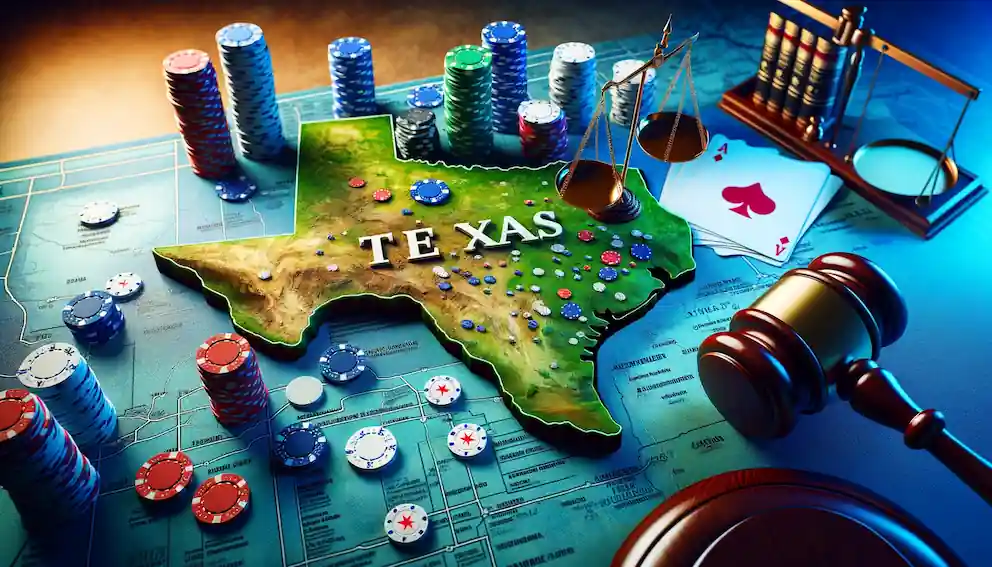Is Online Poker Legal in Texas in 2024?
The question “is online poker legal in Texas” is a significant topic of interest for poker enthusiasts and potential players within the state. Texas, a state renowned for its rich poker history and home to the famous Texas Hold’em variant, has a complex legal stance on gambling, particularly online poker.
Understand in short: Online poker is not explicitly legalized in Texas, leaving it in a legal gray area where it is neither clearly legal nor illegal. Many residents play on offshore sites, which are unregulated and come with significant risks related to consumer protection and security.
Table of Contents
Current Legal Framework
The legal status of online poker in Texas is primarily governed by the Texas Penal Code, specifically Chapter 47, which addresses gambling.
According to these laws, most forms of gambling are considered illegal unless they fall under specific exceptions. The code defines gambling as any game where players bet money or something of value, and the outcome is determined by chance, even if some skill is involved.
Despite this, Texas does allow certain forms of gambling, such as horse racing, dog racing, and the state lottery. However, these exceptions do not extend to online poker, leading to a complex and often confusing legal landscape for poker players.
Online Poker and State Law
As it stands, the question “is online poker legal in Texas” does not have a straightforward answer. Texas law does not specifically address online poker, which means it operates in a legal gray area. While the state’s gambling laws prohibit most forms of gambling, they do not explicitly mention online poker, leaving its legality ambiguous.

Federal Considerations
On a federal level, the Unlawful Internet Gambling Enforcement Act (UIGEA) of 2006 plays a significant role in the regulation of online gambling.
The UIGEA prohibits financial transactions related to illegal online gambling but leaves the definition of illegal gambling to individual states. Because Texas has not explicitly legalized online poker, the UIGEA’s framework adds another layer of complexity to the issue.
Current Online Poker Options
Given the ambiguous legal status, many Texans turn to offshore online poker sites. These platforms operate outside U.S. jurisdiction and are not regulated by Texas law.
While these sites provide an avenue for playing online poker, they come with significant risks such as lack of consumer protection, potential fraud, and unreliable payment processing.
Despite these risks, the popularity of online poker in Texas persists, driven by the state’s deep-rooted poker culture and the demand for accessible poker games.
Legislative Efforts
Over the years, there have been several attempts to change the legal status of online poker in Texas. Various bills have been introduced in the state legislature to legalize and regulate online poker, but none have successfully passed into law.
One of the main challenges is the strong opposition from conservative groups and lawmakers who view gambling as a harmful activity.
In 2021, House Bill 2070 was introduced, which aimed to allow sports betting in Texas. Although the bill did not specifically address online poker, its introduction sparked renewed interest and discussions about the potential for broader gambling reforms in the state.
Public Opinion and Advocacy
Public opinion in Texas on the legalization of online poker is mixed. While there is a significant portion of the population that supports the legalization and regulation of online poker, there are also strong voices against it. Advocacy groups like the Poker Players Alliance (PPA) have been active in lobbying for the legalization of online poker, arguing that regulation would provide consumer protections and generate significant tax revenue for the state.
Future Outlook
The future of online poker in Texas remains uncertain. While there is growing support for the legalization and regulation of online gambling, significant hurdles remain. The state’s conservative political climate and strong opposition to gambling make legislative changes challenging.
However, the success of online poker regulation in other states, such as New Jersey and Pennsylvania, provides a model that Texas could follow.
These states have demonstrated the potential benefits of regulating online poker, including enhanced consumer protections, increased tax revenues, and a more controlled gaming environment.
Related article: Is Poker Online Rigged?

FAQ: Is Online Poker Legal in Texas
1. Is online poker legal in Texas?
Online poker is not explicitly legalized in Texas. The state’s gambling laws do not specifically address online poker, leaving it in a legal gray area where it is neither clearly legal nor illegal.
2. Can I play online poker on offshore sites in Texas?
Many Texans play online poker on offshore sites, which operate outside of U.S. jurisdiction. While these platforms are accessible, they come with risks such as lack of consumer protection, potential fraud, and unreliable payment processing.
3. Have there been any legislative efforts to legalize online poker in Texas?
Yes, there have been several legislative attempts to legalize and regulate online poker in Texas. However, none of these efforts have successfully passed into law due to strong opposition from conservative groups and lawmakers.
4. What are the risks of playing online poker on unregulated sites?
Playing on unregulated offshore sites can be risky because these platforms are not subject to Texas or U.S. laws. This lack of regulation can lead to issues such as unfair gameplay, security vulnerabilities, and difficulties in resolving disputes or recovering funds.
5. What is the future outlook for online poker legalization in Texas?
The future of online poker in Texas is uncertain. While there is growing support for legalization and regulation, significant opposition and a conservative political climate present challenges. However, successful regulation in other states provides a potential model for Texas to follow in the future.
Three Facts About Online Poker and Texas
- Legal Ambiguity: Online poker exists in a legal gray area in Texas. While the state’s gambling laws, governed by the Texas Penal Code, prohibit most forms of gambling, they do not explicitly address online poker. This lack of specific legislation leaves the legality of online poker uncertain and unregulated.
- Legislative Attempts: Over the years, there have been multiple legislative efforts to legalize and regulate online poker in Texas. Notable bills like House Bill 2070 have been introduced to expand gambling laws, but none have successfully passed due to strong opposition from conservative groups and lawmakers who oppose gambling expansion.
- Offshore Sites and Risks: Many Texans play online poker on offshore websites due to the absence of state-regulated options. These sites operate outside U.S. jurisdiction and present significant risks, including lack of consumer protection, potential fraud, and unreliable payment processing. Despite these risks, the popularity of online poker in Texas remains high.
Conclusion
So, is online poker legal in Texas? The answer is complex and not straightforward. While Texas law does not explicitly prohibit online poker, it also does not specifically legalize it, leaving the activity in a legal gray area.
Many Texans play on offshore sites, but these come with risks due to the lack of regulation. Legislative efforts to legalize online poker have faced significant opposition, but the future remains open as public opinion evolves and the state examines potential economic benefits.
For now, players should stay informed about legal developments and exercise caution when choosing where to play.

